
My Twice-Lived Life:
A Memoir of Aging
By Donald M. Murray '48
Ballantine Books, 2001
Don Murray is a professor emeritus of English, a much-loved teacher and mentor, and a respected colleague. He is also well known for the weekly "Now and Then" column he writes for the Boston Globe. His textbooks on writing have been enormously influential in the field of composition, and, at age 29, he won a Pulitzer Prize for his editorials, which appeared in the old Boston Herald.
In his immensely moving memoir, Murray uncovers the situations and circumstances that have shaped his life, finding pattern and purpose. An only child who was often ill, he learned to be comfortable in aloneness. This skill served him well as a paratrooper in World War II, where he developed "the dark, cold strength" that would later help him deal with his daughter's death from Reye's syndrome.
Perhaps the most poignant passages are about aging. He writes about how he and his wife have become sentries, watching each other's progress through the country of old age: "We watch each other out of the corners of our eyes, reading the tint of skin, the hesitant step, the tremor in the hand, the time it takes for a word to travel from thought to speech, the time it takes for the fork to find the mouth. ... We are alert for inflection, pause, pace, grimace, groan, deep breath, sigh, gasp, hearing what is not said, watching what is not done. Married 49 years, we are familiar with each other's commonplace habits and keep reading new meaning into old behaviors. It is wise. It is what we must do, to make sure the other person is on the right side of denial or concern."
Given the success and accomplishment that Murray has known, it is surprising to learn that inadequacy has been his motivator. About work, he writes, "I lived by this belief: I was a person of limited talent and
intelligence who would, by hard work and discipline, overcome my limitations and compete with those who were brighter and more talented than I. I still hold to that truth. I revel in its heroism and treasure its power of motivation. In 'retirement' I get up at 5:30 in the morning to get to work early. I treasure my belief in my inadequacy."
The fruits of that belief are our treasure: powerful prose, eloquent in its simplicity, about a life well lived and stories well told.

The Fourth Hand
By John Irving '65
Random House, 2001
Toward the end of John Irving's 10th novel, his protagonist, Patrick Wallingford, who wants to dump his job as TV anchor at an all-news network to develop a news analysis program for PBS, writes about the lack of context in television news. "It takes time to develop a complex or complicated story; what works best on TV are stories that don't take a lot of time. Disasters are not only sensational--they happen immediately. Especially on television, immediacy works best. I mean 'best' from a marketing point of view, which is not necessarily good for the news."
Wallingford knows firsthand about disaster coverage. While reporting a story from India about the Great Ganesh circus, Wallingford's hand is eaten off by a lion when he sticks his microphone in the lion's cage for the "local color" roar. Wallingford's dutiful cameraman captures the horrible episode on tape, and within 24 hours the less-than-30-second footage is seen around the world.
As a result, Wallingford becomes "the TV journalist for stray acts of God and random nonsense. People called out to him from passing taxis--'Hey, lion guy!' Bicycle messengers hailed him, first spitting the whistles from their mouths--'Yo, disaster man!'"
Irving's novel is about the media, fame, sex, dismemberment and the Green Bay Packers. Some of the funniest passages in the novel are asides, like Wallingford's exchanges with the night doorman in his ex-wife's apartment building, a confused man of Slavic origin who answers to Vlad, Vlade or Lewis, and who is the only person in Irving's world who doesn't recognize Wallingford. He, in fact, mistakes him for the left-handed baseball player Paul O'Neill: "'Don't worry, Mr. O'Neill,' the doorman told Patrick. 'The things they can do in rehab today ... well, you wouldn't believe. It's too bad it
wasn't your right hand--you bein' a leftie is gonna make it tough--but they'll come up with somethin', I know they will.'"
And some of his most memorable characters are minor ones, like Nicholas
Zajac, superstar surgeon, indefatigable dog-poop scooper, runner and part-time father, who has a Web site for potential hand donors and recipients (http://www.needahand.com) and who performs a hand transplant on Wallingford. Which is how Patrick meets Doris Clauson, the Packers fan and widow of the hand transplant donor. Doris has her own agenda and insists on visitation rights to the hand.
"Good novels and films are not like the news, or what passes for the news," Patrick Wallingford thinks. "They are comprised of the whole range of moods you are in when you read them or see them. You can never exactly imitate someone else's love of a movie or a book." Celebrate the authentic, unscripted experience, and read Irving's novel. ~
|
Perspectives on Modern America:
Making Sense of the Twentieth Century
edited by Harvard Sitkoff
Oxford University Press, 2001.
This is a wonderful anthology, edited by a UNH professor of history, that includes interpretive essays on all the big topics: the presidency, conservatism, liberalism, African Americans, women, materialism, religion, ethnicity and others.
|

|
|
Novel Ideas:
Contemporary Authors Share the Creative Process
by Barbara Shoup and Margaret-Love Denman
Alpha Books, 2001.
If you are writing a novel, or are interested in the life of the imagination, you need this book. Margaret-Love Denman is an associate professor of English at UNH, and she and her co-author interviewed 23 notable writers, including Alice McDermott '78G, former UNH professor Ted Weesner, UNH professor emeritus of English John Yount, Wally Lamb, Jane Smiley, Lee Smith and Richard Ford.
|
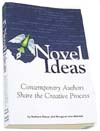
|
|
Strong Stuff: Mothers' Stories
by Emily Moore '79G
1stBooks, 2000.
Taking Studs Terkel's Working as her model, the author has compiled narratives by all kinds of mothers and grouped them into chapters on identity, lessons and traditions, challenge, violence, loss, mothers and fathers, and affirmation. This is a realistic and powerful portrayal of contemporary motherhood.
|
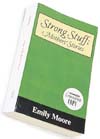
|
|
Sandbox Wisdom
by Tom Asacker '78
Eastside Publishing, 2000.
A business book that encourages you to awaken the wisdom of your childhood to help you discover the truth about branding, marketing, selling and corporate culture.
|
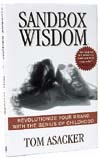
|
|
The Gentle Warrior: General Oliver Prince Smith, USMC
by Clifton La Bree '55
Kent State University Press, 2001.
Using personal notes and diaries, the author reconstructs Smith's career: his command in Iceland, in the Pacific campaigns and especially in Korea.
|
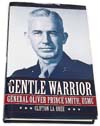
|
|
Becoming a Physician:
Medical Education in Britain, France, Germany and the United States, 1750-1945
by Thomas Neville Bonner
Johns Hopkins University Press, 2001.
First published in 1995, this comprehensive and compelling narrative history, written by a former UNH president, is now available in paperback.
|
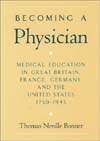
|
|
Women After Communism: The East German Experience
by Helen Frink '68
University Press of America, 2001.
This book includes interviews with and research into the lives of East German women during the socialist regime from 1949 through 1989 and their adjustment to life under capitalism. Frink is a professor at Keene State College.
|
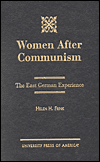
|
|
Understanding Psychological Research:
An Introduction to Methods
by Richard St. Jean '70G
Prentice Hall Canada, 2001.
A highly readable and concise introduction to a broad range of psychological research methods. St. Jean is a professor at the University of Prince Edward Island.
|
|

